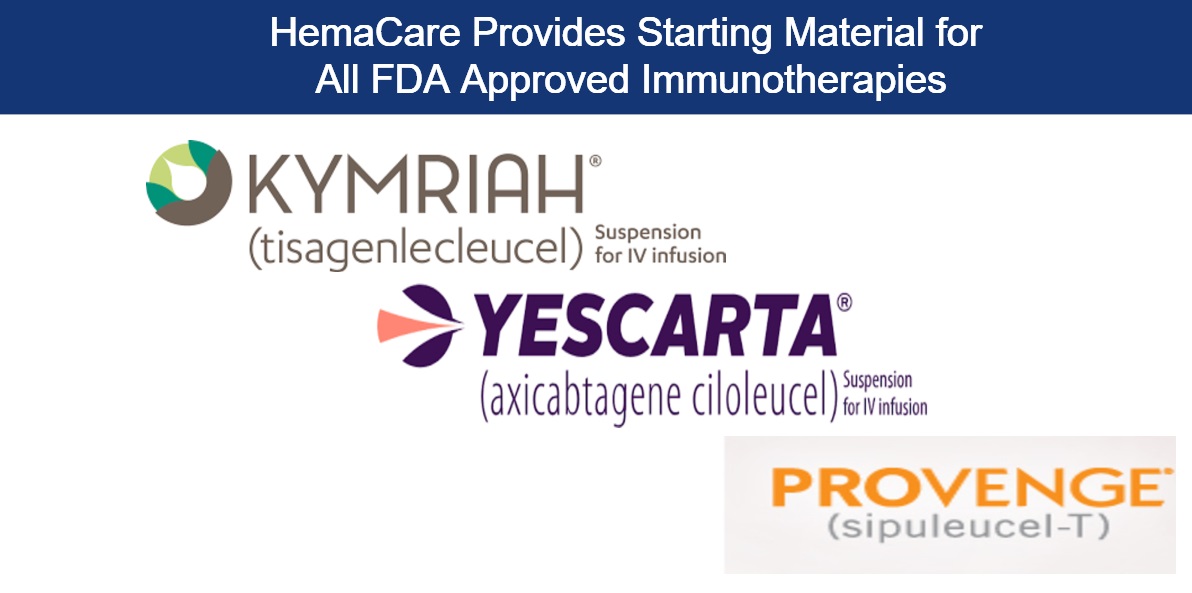HemaCare Corporation (OTCMKTS: HEMA) is a long-standing leader in the customization and supply of human-derived biological products and services for biomedical research and cell therapy. Within the U.S. and internationally, the company is well-known for its network of FDA-registered, GMP/GTP-compliant collection centers where it collects human biological materials. Types of cellular materials collected and supplied by Hemacare include peripheral blood, bone marrow, and cord blood, each of which it isolates into primary cells types and can supply to customers in both fresh and frozen states.
Headquartered near Los Angeles in Van Nuys, California, the company made an astounding announcement this week, stating that it is the “provider of leukapheresis process development material for 100% of the current FDA-approved immunocellular therapies,” which include:
- Kymriah® (Novartis; Switzerland)
- Yescarta® (Kite, a Gilead Company; CA, USA)
- Provenge® (Dendreon; WA, USA).
As stated in the Hemacare press release:
“During the development process, HemaCare worked collaboratively with each company to source healthy donors per project requirements. All leukapheresis material was collected and shipped following stringent standards as developed by the AABB and accepted by the FDA. In some cases, HemaCare performed further processing by splitting collections for comparability runs, freezing material, or adding isolated cells to mimic patient collection material.
Industry cell therapy thought-leaders rely heavily on HemaCare’s extensive and recallable donor database, one of the largest in the industry. ‘While at Novartis, Biogen, and now Mustang, HemaCare has provided high-quality leukapheresis starting material for process development work. They are highly collaborative, reliable, and a valued partner in the industry,’ said Knut Niss, Ph.D., Chief Technology Officer, Mustang Bio, Inc.”
FDA Approved Cell and Gene Therapies
Thus far, the U.S. FDA has approved 16 cell and gene therapy product. Interestingly, eight (50%) of these are umbilical cord blood derivatives and three have been immunotherapies (20%).
The 16 cell and gene therapy products approved by the FDA include:
- ALLOCORD (HPC Cord Blood) – SSM Cardinal Glennon Children’s Medical Center
- LAVIV (Azficel-T) – Fibrocell Technologies
- MACI (Autologous Cultured Chondrocytes on a Porcine Collagen Membrane) – Vericel Corp.
- CLEVECORD (HPC Cord Blood) – Cleveland Cord Blood Center
- GINTUIT (Allogeneic Cultured Keratinocytes and Fibroblasts in Bovine Collagen) – Organogenesis Incorporated
- HEMACORD (HPC, cord blood) – New York Blood Center
- Ducord, HPC Cord Blood – Duke University School of Medicine
- HPC, Cord Blood – Clinimmune Labs, University of Colorado Cord Blood Bank
- HPC, Cord Blood – MD Anderson Cord Blood Bank – MD Anderson Cord Blood Bank
- HPC, Cord Blood – LifeSouth – LifeSouth Community Blood Centers, Inc.
- HPC, Cord Blood – Bloodworks – Bloodworks
- IMLYGIC (talimogene laherparepvec) – BioVex, Inc., a subsidiary of Amgen Inc.
- KYMRIAH (tisagenlecleucel) – Novartis Pharmaceuticals Corporation
- LUXTURNA – Spark Therapeutics, Inc
- PROVENGE (sipuleucel-T) – Dendreon Corp.
- YESCARTA (axicabtagene ciloleucel) – Kite Pharma, Inc.
Hemacare Expansion of Facilities
In addition to the accomplishment of providing leukapheresis process development material for FDA-approved immunocellular therapies, Hemacare is actively expanding its operations.
By the end of the year, Hemcare will relocate to a new a facility where it will expand its onsite GMP capabilities “beyond collection to include four clean rooms enabling GMP cell processing, isolation, cryopreservation, and biobanking services to further support the development efforts of novel cellular therapies.”
To learn more about Hemacare’s role in providing leukapheresis process development material for cellular therapies, view the full press release here: HemaCare Provides Starting Material for Three FDA Approved Cellular Therapies
Do you have questions about Hemacare or the types of biological materials they supply? Ask them in the questions below.




















Tell Us What You Think!